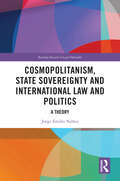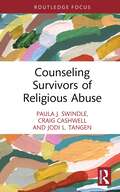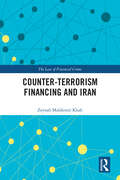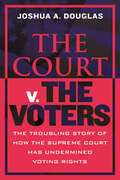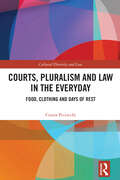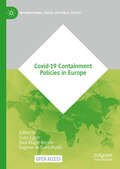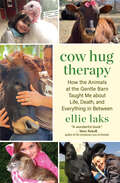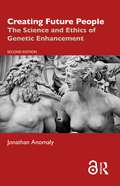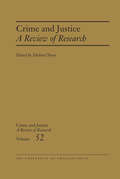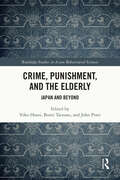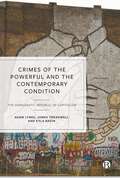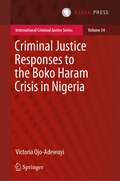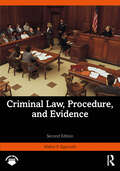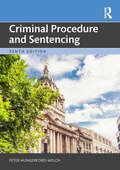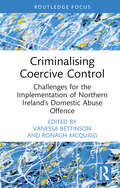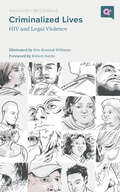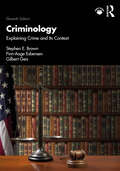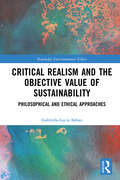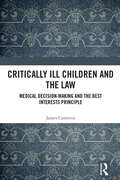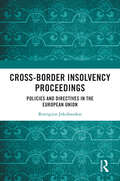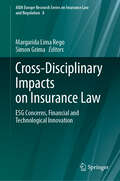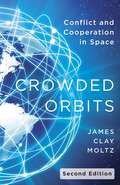- Table View
- List View
Cosmopolitanism, State Sovereignty and International Law and Politics: A Theory (Routledge Research in Legal Philosophy)
by Jorge E. NúñezThis book assesses the relationship between cosmopolitanism and sovereignty. Often considered to be incompatible, it is argued here that the two concepts are in many ways interrelated and to some extent rely on one another. By introducing a novel theory, the work presents a detailed philosophical analysis to illustrate how these notions might theoretically and practically work together. This theoretical inquiry is balanced with detailed empirical discussion highlighting how the concepts are related in practice and to expose the weaknesses of stricter interpretations of sovereignty which present it as exclusionary. Finally, the book looks at territorial disputes to explore how sovereignty and cosmopolitanism can successfully operate together to deal with global issues. The work will be of interest to academics and researchers in the areas of Legal Philosophy, Legal Theory and Jurisprudence, Public International Law, International Relations and Political Science.
Counseling Survivors of Religious Abuse (Routledge Focus on Religion)
by Paula J. Swindle Craig Cashwell Jodi L. TangenThis book identifies and analyzes the forms, causes, and potential treatments of religious abuse. Religious abuse can include experiences of sexual, physical, emotional, spiritual, and mental abuse connected to a religious context. The book will help readers understand different types of religious abuse, including where the perpetrator is a religious leader, a group, or a system, as well as when there is an overtly spiritual element connected to the justification for the abuse. It also describes common experiences of those who have experienced religious abuse and some treatment approaches that will be useful to mental health providers when their clients present with these experiences. The rigorous scholarly approach of this book provides an academically grounded insight into this complex topic. As such, it will be a key reference for those studying and working in Religious Studies, Religion and Psychology, the Sociology of Religion, and Counseling and Mental Health.
Counter-Terrorism Financing and Iran (The Law of Financial Crime)
by Zeynab Malakouti KhahThis book blends doctrinal and empirical research to examine the phenomenon of counter-terrorism financing at the level of both international and Iranian national law. The work discusses the legitimacy, fairness and effectiveness of the international counter-terrorism financing framework, and then examines to what extent Iran has implemented it. The main focuses of the book are on the criminalisation of terrorism financing; financial regulations as preventive measures applied to the sectors at risk of terrorism financing, including the formal financial system, the informal financial system and the non-profit organisations; and the international and unilateral sanctions imposed on individuals and entities who support terrorist acts, terrorists and terrorist organisations. Given that terrorism and terrorism financing are socio-legal, political and economic phenomena in nature, the book approaches the problem of terrorism financing from an interdisciplinary perspective, exploring the relationship between the characteristics of Iran as a state recognised for supporting non-state militant actors (NSMAs), some of which are designated as terrorist by some countries. Empirical research includes documentary fieldwork in Iran, with the collection of original and primary materials that have not previously been analysed. The book also adopts a policy transfer approach, using the rules and regulations of the United Kingdom. Presenting a non-Western perspective on counter-terrorism financing, the book will be essential reading for students, researchers and policy-makers working in the area of financial crime.
The Court v. The Voters: The Troubling Story of How the Supreme Court Has Undermined Voting Rights
by Joshua A. DouglasAn urgent and gripping look at the erosion of voting rights and its implications for democracy, told through the stories of 9 Supreme Court decisions—and the next looming case In The Court v. The Voters, law professor Joshua Douglas takes us behind the scenes of significant cases in voting rights—some surprising and unknown, some familiar—to investigate the historic crossroads that have irrevocably changed our elections and the nation. In crisp and accessible prose, Douglas tells the story of each case, sheds light on the intractable election problems we face as a result, and highlights the unique role the highest court has played in producing a broken electoral system. Douglas charts infamous cases like: Bush v. Gore, which opened the door to many election law claimsCitizens United, which contributed to skewed representation—but perhaps not in the way you might thinkShelby County v. Holder, which gutted the vital protections of the Voting Rights ActCrawford v. Marion County Elections Board, which allowed states to enforce voter ID laws and make it harder for people to vote The Court v. The Voters powerfully reminds us of the tangible, real-world effects from the Court&’s voting rights decisions. While we can—and should—lament the democracy that might have been, Douglas argues that we can—and should—double down in our efforts to protect the right to vote.
Courts, Pluralism and Law in the Everyday: Food, Clothing and Days of Rest (Cultural Diversity and Law)
by Cinzia PiciocchiThis book examines the everyday judicial experience in four multicultural jurisdictions as a means of exploring the relationship between legal systems and cultural identities. Increasing social heterogeneity has deeply affected legal systems as courts and parliaments must now deal with a growing rate of cases concerning cultural pluralism. Headline-grabbing disputes usually concern challenges to fundamental rights and principles which may be put at risk by some religious or cultural practices. These are difficult issues questioning the compatibility between some cultural and religious practices and constitutional values. However, much of the interaction between law and cultural pluralism also concerns daily life activities, which do not necessarily challenge fundamental rights. This book deals with food, clothing and days of rest: three expressions of both human needs and identity which are based on ethnic origin, tradition, culture, religion or, simply, taste. The volume looks at the intersection between these choices and constitutional rights such as religious liberty or freedom of expression. It aims to understand how the state legal system deals with them and when non-mainstreaming behaviours are accommodated. Four legal systems are taken into consideration – the United States of America, Canada, France and Italy – exploring similarities and differences in facing cultural diversity around these quotidian issues. The book pays particular attention to the places where diversity is most apparent and also considers the choices that are not based on religious precepts, but rather on “personal philosophy”. The book will be of interest to researchers, academics and policy-makers working in the areas of constitutional law, law and cultural diversity, human rights, minority rights and discrimination law.
Covid-19 Containment Policies in Europe (International Series on Public Policy)
by Clara Egger Raul Magni-Berton Eugénie de Saint-PhalleThis open access book examines the diverse strategies implemented by national and local European governments to contain the Covid-19 pandemic. Rather than focus on individual national case studies, it brings together leading scholars and policymakers to analyse the wide range of containment policies utilised across the continent at various levels of government. In doing so, the volume assesses Covid-19 crisis-management experiences to identify good practices based on comparative and fine-grained evidence. It argues that such a stock-taking exercise is crucial to better prepare European polities and societies for future crises, including climate change and environmental disasters. The book will appeal to scholars and students of public policy, crisis-management, public administration, international relations and comparative law.
Cow Hug Therapy: How the Animals at the Gentle Barn Taught Me about Life, Death, and Everything in Between
by Ellie LaksThe inspirational story of the compassionate and wise animals of the Gentle Barn and how they became a therapeutic salve for countless guests — and mentors for all of us in how to live and die In Cow Hug Therapy, Ellie Laks recounts the extraordinary journey that started with her first teacher, Buddha — not the religious figure, but a rescued miniature Hereford cow. One evening Buddha wrapped her neck around an exhausted and upset Ellie and transferred a singular form of healing and comfort with an incredible impact. Understanding that this was something to be shared with others, Ellie developed Cow Hug Therapy, a groundbreaking approach to emotional healing that has proved effective for trauma, illness, disabilities, addiction, grief, and stress. This colorful and compelling narrative introduces the healing mavens of the barnyard, each with a unique story of being rescued from trauma and treated with love and respect. In their new role at Ellie’s Gentle Barn sanctuaries, these animals have transformed lives and ignited breakthroughs and newfound purpose for visitors including a young mother who lost her baby, a suicidal teenager, a wounded serviceman, an open-heart-surgery patient, and many more. A testament to empathy and the mission to heal animals, people, and the planet, Cow Hug Therapy serves as a beacon of hope for all seeking healing and connection.
Creating Future People: The Science and Ethics of Genetic Enhancement
by Jonathan AnomalyCreating Future People offers readers a fast-paced primer on how advances in genetics will enable parents to influence the traits of their children, including their children’s intelligence, moral capacities, physical appearance, and immune system. It explains the science of gene editing and embryo selection and motivates the moral questions it raises by thinking about the strategic aspects of parental choice. Professor Anomaly takes seriously the diversity of preferences parents have, and the limits policymakers face in regulating what will soon be a global market for reproductive technology. Anomaly argues that once embryo selection for complex traits happens it will change the moral landscape by altering the incentives each person faces. All of us will take an interest in the traits everyone else selects, and this will present coordination problems that previous writers on genetic enhancement have failed to consider. Anomaly ends by considering how genetic engineering will transform humanity.Key Updates to the Second Edition Significant revisions to include more details about what will be scientifically possible in the coming years and the moral issues these developments will raise. New and substantial coverage of embryo selection (guided by polygenic scores) for minimizing the risk of genetic diseases. Engagement with all important, new publications on the science of genetic enhancement
Crime and Justice, Volume 52: A Review of Research (Crime and Justice: A Review of Research #52)
by The University of Chicago PressVolume 52 is an annual survey of cutting-edge issues by preeminent criminology scholars. Since 1979, Crime and Justice has presented a review of the latest international research, providing expertise to enhance the work of sociologists, psychologists, criminal lawyers, justice scholars, and political scientists. The series explores a full range of issues concerning crime, its causes, and its cures. In both the review and the thematic volumes, Crime and Justice offers an interdisciplinary approach to address core issues in criminology.
Crime, Punishment, and the Elderly: Japan and Beyond (Routledge Studies in Asian Behavioural Sciences)
by Yoko Hosoi Bunri Tatsuno John PrattHosoi, Tatsuno and Pratt examine the realities, problems and backgrounds of crimes committed by elderly people in both Japan and international perspectives.Japan’s aging population is a commonly known issue globally, and the world looks to Japan to understand the issues that other nations may experience in the future. One such aspect is an increase in crimes committed by the elderly. According to the National Police Agency in Japan, the proportion of elders arrested for committing theft has doubled over the past 10 years. The chapters in this volume look to answer questions around the reason for elder crime, the types of crime and punishment that exists in this cohort of society and how this increasingly large problem in society can be managed.This book offers important insights into the societal issues and potential solutions for aging societies around the world. It will be a valuable research reference for scholars of mental health, criminology, population studies and Asian studies.
Crimes of the Powerful and the Contemporary Condition: The Democratic Republic of Capitalism
by James Treadwell Adam Lynes Kyla BavinThe ultimate expression of power is the ability to act beyond the confines of law, with contemporary society enabling elite groups to wield “panoramic power”. From the murderous crimes of the corporate giants that provide us with life’s luxuries and necessities to the data gathering activities of media and educational institutions, the authors offer new thinking on damaging structures of power and privilege. This accessible book provides a comprehensive understanding of elite corporate wrongdoing, and the late capitalist society that enables harm, considering both how we got into this mess and how we get out of it.
Criminal Justice Responses to the Boko Haram Crisis in Nigeria (International Criminal Justice Series #34)
by Victoria Ojo-AdewuyiThis book concentrates on the crisis perpetrated by the Boko Haram group in Nigeria, which since 2009 has made a definitive impact on both the domestic and international criminal landscape. The volume centres on three core issues: first, an assessment of the criminal legal responses at the domestic level, where the legal characterization of the conducts in question, including an evaluation of the state of specific domestic prosecutions, are assessed. Secondly, the book gauges the potential for international criminal justice while evaluating the Boko Haram situation at the International Criminal Court. This includes an assessment of the jurisdictional aspects, the admissibility, and the interests of justice requirements in addition to the appraisal of conducts amounting to war crimes and crimes against humanity perpetrated.Finally, the book explores possible non-prosecutorial responses in the form of classic and non-classic transitional justice mechanisms that may be utilized as a response to the crisis in Nigeria. Furthermore, it draws instructive lessons from Nigeria’s past misadventure with specific transitional justice mechanisms while exploring the realities of utilizing the restorative justice mechanisms available in Nigeria. The volume concludes by calling for a victim-centred approach in the discourse around the Boko Haram crisis.This book presents a definitive study of the history of the development of Boko Haram and the related domestic and international criminal legal issues. Researchers and anyone seeking to understand the Boko Haram crisis in relation to international criminal law, including those looking for a clear overview of the criminal conduct perpetrated by Boko Haram in Nigeria and a view of Nigeria’s domestic legal regime, will benefit from the information on offer.Victoria Ojo-Adewuyi is a lawyer, called to the Nigeria Bar in 2012. She obtained a Bachelor of Laws degree (LL.B) in 2011 from the Obafemi Awolowo University, Ile-Ife (Nigeria), obtained a Master of Laws Degree (LL.M) from the University of the Western Cape, Cape Town (South Africa) and Humboldt Universität zu Berlin under the South African-German Centre for Transnational Criminal Justice in 2016, and completed her doctorate in International Criminal Law at the Humboldt-Universität zu Berlin (Germany) in 2022.
Criminal Law, Procedure, and Evidence
by Walter P. SignorelliProviding a complete view of U.S. legal principles, this book addresses distinct issues as well as the overlays and connections between them. It presents as a cohesive whole the interrelationships between constitutional principles, statutory criminal laws, procedural law, and common-law evidentiary doctrines. This fully revised and updated new edition also includes discussion questions and hypothetical scenarios to check learning. Constitutional principles are the foundation upon which substantive criminal law, criminal procedure law, and evidence laws rely. The concepts of due process, legality, specificity, notice, equality, and fairness are intrinsic to these three disciplines, and a firm understanding of their implications is necessary for a thorough comprehension of the topic. This book examines the tensions produced by balancing the ideals of individual liberty embodied in the Constitution against society’s need to enforce criminal laws as a means of achieving social control, order, and safety. Relying on his first-hand experience as a law enforcement official and criminal defense attorney, the author presents issues that highlight the difficulties in applying constitutional principles to specific criminal justice situations. Each chapter of the text contains a realistic problem in the form of a fact pattern that focuses on one or more classic criminal justice issues to which readers can relate. These problems are presented from the points of view of citizens caught up in a police investigation and of police officers attempting to enforce the law within the framework of constitutional protections. This book is ideal for courses in criminal law and procedure that seek to focus on the philosophical underpinnings of the system.
Criminal Procedure: From First Contact To Appeal
by John L. WorrallCriminal Procedure is an authentic study of criminal procedure, for both the novice reader and the aspiring law student. It provides a comprehensive introduction to criminal procedure, from a first encounter with the police, all the way through to appeal. Assuming no legal expertise, the text connects criminal procedure cases to real-life implications through innovative pedagogy. For example, decision-making exercises position you as a judge and challenge you to decide cases based on the facts presented. Conversational and easy to read, the 7th Edition adds Supreme Court decisions through the 2021 -22 term and analyzes their impact on criminal and legal processes. Topics covered include qualified immunity, pretrial detentions, victim impact statements and warning shots, among many others.
Criminal Procedure and Sentencing
by Peter Hungerford-WelchCriminal Procedure and Sentencing provides a comprehensive and up-to-date guide to each step of criminal procedure, from the arrest of the suspect through to trial, sentencing, and appeals. Taking a strong practical focus throughout, it covers all aspects of the process of the criminal courts.The tenth edition has been fully revised and significantly expanded, with updates including: key recent case law, new legislation including the Sentencing Act 2020, the Judicial Review and Courts Act 2022, and the Police, Crime and Sentencing Act 2022, as well as the latest Criminal Procedure Rules and the new Criminal Practice Directions. Online support material will offer readers access to regular updates to the law and a comprehensive set of web links, as well as advice on additional reading and research for those seeking to engage in critical evaluation of the criminal justice system.The author’s authoritative yet engaging writing style brings the subject to life and helps to explain complex issues in an easy-to-understand way. This is an ideal text for anyone studying the criminal justice system at a professional or academic level.
Criminalising Coercive Control: Challenges for the Implementation of Northern Ireland’s Domestic Abuse Offence (Routledge Frontiers of Criminal Justice)
by Vanessa Bettinson Ronagh McQuiggDrawing on experiences from other jurisdictions within the UK, Criminalising Coercive Control explores the challenges and potential successes which may be faced in implementing Northern Ireland’s new domestic abuse offence. A specific offence of domestic abuse was introduced in Northern Ireland in March 2021. This represents a crucial development in Northern Ireland’s response to domestic abuse. The new legislation has the effect of criminalising coercive and controlling behaviour, thereby bringing Northern Ireland into line with other jurisdictions within the UK, and also with relevant human rights standards in this regard. The book begins with a discussion regarding the offence itself and the underpinning domestic abuse policy in Northern Ireland. Subsequent chapters explore further measures which may be needed to respond effectively to domestic abuse in Northern Ireland, by drawing upon the experiences of other jurisdictions of criminalising coercive control. These reflections are considered through the lenses of policing, prosecutorial practice and frontline domestic abuse working. Criminalising Coercive Control will be of great interest to students and scholars in a variety of fields, such as criminal law, criminology, social policy, human rights, family law, gender studies and sociology. The book is also accessible beyond academia, including practitioners and those in the voluntary sector who are working in the area of combating domestic abuse.
Criminalized Lives: HIV and Legal Violence (Q+ Public)
by Alexander McClellandCanada has been known as a hot spot for HIV criminalization where the act of not disclosing one’s HIV-positive status to sex partners has historically been regarded as a serious criminal offence. Criminalized Lives describes how this approach has disproportionately harmed the poor, Black and Indigenous people, gay men, and women in Canada. In this book, people who have been criminally accused of not disclosing their HIV-positive status, detail the many complexities of disclosure, and the violence that results from being criminalized. Accompanied by portraits from artist Eric Kostiuk Williams, the profiles examine whether the criminal legal system is really prepared to handle the nuances and ethical dilemmas faced everyday by people living with HIV. By offering personal stories of people who have faced criminalization first-hand, Alexander McClelland questions common assumptions about HIV, the role of punishment, and the violence that results from the criminal legal system’s legacy of categorizing people as either victims or perpetrators. Note: A regrettable error appears on page 22. The number 240 should be 206 when referring to the number of people prosecuted in relation to allegations of HIV nondisclosure. This will be fixed in future reprints.
Criminology: Explaining Crime and Its Context
by Finn-Aage Esbensen Gilbert Geis Stephen E. BrownCriminology: Explaining Crime and Its Context, Eleventh Edition, offers a broad perspective on criminological theory. It provides students of criminology, criminal justice, and sociology with a thorough exposure to a range of theories about crime, contrasting their logic and assumptions, but also highlighting efforts to integrate and blend these frameworks.In this new edition, the authors have incorporated new directions that have gained traction in the field, while remaining faithful to their criminological heritage. Among the themes in this work are the relativity of crime (its changing definition) with abundant examples, historical roots of criminology and the lessons they have provided, and the strength and challenges of applying the scientific method. This revision offers new chapters on critical theory and on life-course criminology. It is updated throughout to reflect current trends in criminological theory and data.With chapters both updated to reflect recent developments in the field and made easier to digest, this text is essential reading for students of criminology, criminal justice, sociology, and related fields.
Critical Infrastructure Protection XVII: 17th IFIP WG 11.10 International Conference, ICCIP 2023, Arlington, VA, USA, March 13–14, 2023, Revised Selected Papers (IFIP Advances in Information and Communication Technology #686)
by Jason Staggs Sujeet ShenoiThe information infrastructure – comprising computers, embedded devices, networks and software systems – is vital to operations in every sector: chemicals, commercial facilities, communications, critical manufacturing, dams, defense industrial base, emergency services, energy, financial services, food and agriculture, government facilities, healthcare and public health, information technology, nuclear reactors, materials and waste, transportation systems, and water and wastewater systems. Global business and industry, governments, indeed society itself, cannot function if major components of the critical information infrastructure are degraded, disabled or destroyed. Critical Infrastructure Protection XVII describes original research results and innovative applications in the interdisciplinary field of critical infrastructure protection. Also, it highlights the importance of weaving science, technology and policy in crafting sophisticated, yet practical, solutions that will help secure information, computer and network assets in the various critical infrastructure sectors. Areas of coverage include: Themes and IssuesSmart Grid Risks and ImpactsNetwork and Telecommunications Systems SecurityInfrastructure SecurityAutomobile Security This book is the seventeenth volume in the annual series produced by the International Federation for Information Processing (IFIP) Working Group 11.10 on Critical Infrastructure Protection, an international community of scientists, engineers, practitioners and policy makers dedicated to advancing research, development and implementation efforts focused on infrastructure protection. The book contains a selection of eleven edited papers from the Seventeenth Annual IFIP WG 11.10 International Conference on Critical Infrastructure Protection, which was held at SRI International, Arlington, Virginia, USA in the spring of 2023. Critical Infrastructure Protection XVII is an important resource for researchers, faculty members and graduate students, as well as for as well as for policy makers, practitioners and other individuals with interests in homeland security.
Critical Realism and the Objective Value of Sustainability: Philosophical and Ethical Approaches (Routledge Environmental Ethics)
by Gabriela-Lucia SabauCritical Realism and the Objective Value of Sustainability contributes to the growing discussion surrounding the concept of sustainability, using a critical realist approach within a transdisciplinary theoretical framework to examine how sustainability objectively occurs in the natural world and in society. The book develops an ethical theory of sustainability as an objective value, rooted not in humans’ subjective preferences but in the holistic web of relationships, interdependencies, and obligations existing among living things on Earth, a web believed to have maintained life on Earth over the last 3.7 billion years. It proposes three pillars of sustainability ethics: contentment for the human existence given to us; justice (beyond distributive justice); and meaningful freedom (within ecological and moral limits). Using abductive reasoning, the book infers that there is an out-of-this-world Sustainer behind the Earth’s sustainability acting as a metaphysical source of all being and value. It argues that sustainability value, accepted as a shared understanding of the common good, must guide individual decisions and socio-economic development efforts as a matter of deliberate choice, as well as be built on the awareness that there are non-negotiable, pre-established conditions for our planet’s sustainability. This book will be of interest to students and scholars across fields of inquiry, including sustainability, sustainable development, environmental philosophy and ethics, philosophy of science, and ecological economics, and to whoever may wonder why seasons exists and why humans have creative minds.
Critically Ill Children and the Law: Medical Decision-Making and the Best Interests Principle
by James CameronA series of recent high-profile court cases has demonstrated the inadequacy of current laws in addressing issues relating to medical treatment decisions involving seriously ill children. The challenges of determining that life-sustaining medical treatment is not in a young child’s best interests have resulted in criticism of the best interests principle. This book explores the theoretical foundations of the best interests principle, and alternatives offered in the academic literature, to allow readers to understand why the principle remains contentious despite its prevalence. It provides theoretical background, exploration of what occurs in practice, and proposes a novel approach to address these challenges. Frameworks for decision-making identified in the academic literature are used to examine the application of the best interests principle in practice in England and Wales, Australia, and New Zealand through a review of the case law and qualitative research with paediatric doctors. The exploration of current practice allows readers to understand the challenges of applying the best interests principle, but also the need to retain a focus on the child. Readers are introduced to a human-rights based approach, which ensures that the focus remains on upholding the child’s best interests but also provides a more comprehensive explanation of the situation. Progressing the debate around end-of-life decision-making and children, the book will be a valuable resource for academics, researchers and policy-makers. It will also provide practical guidance to both legal and medical practitioners in managing disputes about the provision of life-sustaining treatment.
Cross-Border Insolvency Proceedings: Policies and Directives in the European Union
by Remigijus JokubauskasThis book presents an analysis of the effectiveness of European Union cross-border insolvency proceedings. It provides a thorough assessment of the development of cross-border insolvency proceedings established in the Regulation on Insolvency Proceedings ((EU) 2015/848) and how they contribute to the general goals of the EU internal market. Insolvency law has not been subject to a global mandatory harmonization process, with no globally biding legal act. Instead, the landscape of international insolvency law is characterized by a patchwork of national laws that seek to accommodate cross-border insolvencies and soft law agreements. In the EU cross-border insolvency law holds significant importance in ensuring the smooth operation of the internal market. Fostering international investments and legal foreseeability in insolvency proceedings, it upholds the fundamental freedoms within EU law. This book covers the main elements of EU cross-border insolvency law, such as jurisdiction, applicable law, recognition and enforcement of judgments. It also focuses on previously unexplored areas, such as the exercise of creditors' rights in cross-border insolvency cases and the tracing and recovery of assets and discusses the application of the Restructuring and Insolvency Directive ((EU) 2019/1023) in relation to the rescue of viable companies and the discharge of debts for insolvent entrepreneurs. This book will be of interest to students and practitioners of insolvency law, EU law and private international law. It will also be useful for national legislators and EU institutions working on the development of EU insolvency law.
Cross-Disciplinary Impacts on Insurance Law: ESG Concerns, Financial and Technological Innovation (AIDA Europe Research Series on Insurance Law and Regulation #8)
by Simon Grima Margarida Lima RegoThis book explores the insurance sector’s potential role, influence, and impact on society in light of new environmental, social, and governance (ESG) concerns. Furthermore, it looks into how financial and technological innovations help reshape insurance regulation and business models. Unlike their predecessors, 21st century insurers have a growing impact on cross-sector service provision by making available to their clients a wealth of expert knowledge and experience in data analytics. The book delves into insurers’ transition from suppliers of products – consisting of risk coverage or investment opportunities – to providers of various services, and ultimately to solution providers by partnering with their clients so as to prevent failure, optimize their clients’ operations and help them excel in their economic sector. Insurance regulations and policies can be affected by various factors, such as changes in the economy, technological advances, and shifting consumer preferences, to name a few. Additionally, the insurance industry can have a significant bearing on the wider economy, making it important for the industry to operate within a framework of comprehensive regulations.This book includes a diverse set of theoretical, empirical, and policy-oriented chapters on particular aspects of new trends and wider analyses leading to a more systematic understanding of the industry’s socio-economic role. It offers a mixture of chapters from insurance academics and professionals from different countries, cultures, and scientific backgrounds. The methodologies used are diverse, including legal, sociological, historical, economic and financial as well as interdisciplinary analyses. The book has a global scope, including chapters of a more global nature and others addressing particular jurisdictions on different continents, including Europe, Asia and North America.
Crossing the Desert: The Power of Embracing Life's Difficult Journeys
by Payam ZamaniAt the age of 16, he escaped persecution and made his way to America as a refugee. At 28, he secured a billion-dollar IPO. Today, he&’s redefining what it means to be an entrepreneur by building a new model of capitalism.In the summer of 1987, Payam Zamani fled Iran. As a member of the Baha&’i Faith, he had already survived years of religious persecution at the hands of Islamic fundamentalists. Taking the only path available to him, he escaped to Pakistan through the Emptiness Desert: a harrowing five-day trek through one of the hottest, driest, and most hostile regions on the planet.Twelve years later, he and his brother set records when the company they founded hit a $1.2 billion valuation on Wall Street. He was rich—on paper. But in the wake of yet another Wall Street meltdown, he learned the hard way that modern capitalism can be harmful to the human soul.In 2015, Payam set the example he wanted to see by merging his business acumen with his spiritual beliefs and founding a new company—One Planet Group—this time without letting Wall Street or the venture capital world dictate the terms. Today, One Planet Group is proving that it&’s not only possible but necessary to build strong businesses while taking care of our employees, customers, communities, and the planet.Crossing the Desert gives readers an intimate look at how the paths we choose, the values we embrace, and the systems we decide to participate in (or not) can make or break us, not only financially, but spiritually. Payam&’s story is a timely reminder that enduring and embracing life&’s most difficult journeys can lead us to a brighter future—not only for ourselves, but for the people around us, and even the world.
Crowded Orbits: Conflict and Cooperation in Space
by James Clay MoltzSpace has become increasingly crowded since the turn of the century, as a growing number of countries, companies, and even private citizens have begun operating satellites and become spacefarers. Crowded Orbits offers readers a valuable primer on space policy from an international perspective, examining technology, diplomacy, commerce, science, and military applications. This second edition is thoroughly updated to cover events of the decade following the book’s original publication in 2014, when the pace of the competition to exploit space has accelerated dramatically.James Clay Moltz examines the ongoing tension between competition and cooperation in space, tracing the geopolitical and policy consequences of key developments. Drawing on decades of experience, he considers possible avenues for collaboration among the growing number of actors as well as the forces driving potential space-related conflicts. Moltz examines the challenges to existing treaties and other governance mechanisms that have struggled to keep up with the spread of technology. He provides policy recommendations to enhance international collaboration, further scientific exploration, and restrain harmful military activities. This edition features analysis of a range of topics, including the ongoing commercialization of space by SpaceX, Planet, and other start-up companies; new capabilities to monitor Earth from space; renewed tensions between the United States and rivals China and Russia in military activities; and emerging multinational competition on the Moon.
